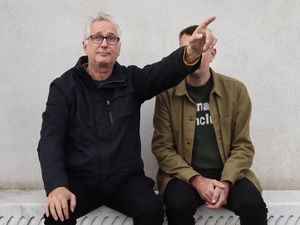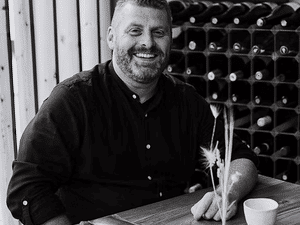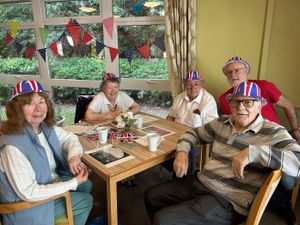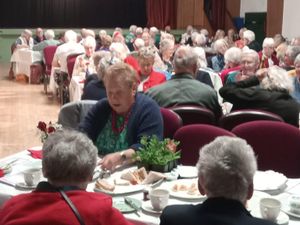Olympian Louis Smith talks Strictly Come Dancing before the live tour arrives in Birmingham
Before we start talking, we receive a little note.
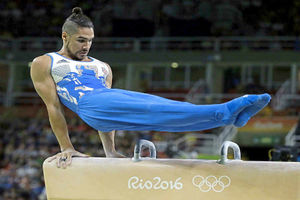
It politely asks us to steer clear of asking Louis Smith any questions about a needlessly sensationalised controversy that was part bad luck and part misjudgement.
Smith was filmed mocking Islam in October.
It was a spur of the moment thing; a bad joke that morphed from innocent-but-tasteless joke into a celeb-bashing-fest in less time than it takes for Smith to dismount from a pommel.
The Sun, The Guardian, The Daily Mail and Aunty Beeb took great delight in putting the Beijing, London and Rio medallist back in his box.
Louis, for his part, did all the right things. He held up his hands, said a great big 'sorry', explained that he didn't intend to cause offence then went to a mosque to show contrition and humility. If ever there was an exercise in fessing up and making good, that was it.
So while most of our conversation dwells on stuff like, you know, winning medals at the Olympics, proving equally adept with his dance moves by being crowned champion on Strictly Come Dancing and building a foundation for his success locally, at Lilleshall, we politely circumvent the caveat issued by Louis' manager and dwell for a little while on his life in the public eye ahead of bringing his latest venture to Birmingham.
Honestly
And – as is always the case in situations like this – the man answering the questions is more than happy to engage honestly, openly and with the greatest transparency. He's nothing to hide. He made a mistake. He didn't mean to hurt anyone and he's taken responsibility.
"It's quite difficult being a role model, to be honest. I am Louis Smith and Louis Smith isn't always what you guys see. In the sporting world I'm asked very sensible questions and I give a sensible answer.
"But there's more to me than sport.
"It's difficult to get your personality across when you're in such an environment and people put you on such a high pedestal. Olympians are paid the least but put on the highest pedestal. As soon as we do something wrong, it becomes a blown-up situation.
"It's tough, you know. It's hard sometimes being a role model."
And yet a role model is precisely what he is. Louis is the acme of zero to hero. He's the archetypal working class hero. He's the apogee of dedication and commitment.
Louis is living proof that relentless hard work allied to talent and great personal sacrifice can yield the greatest results. To millions, he is a role model. And though that burden would sit heavily on any man's shoulders, it's one he knows he has to carry.
"I aspire to show kids what sport can do for you and how it can change your life. Gymnastics got me off the street. I grew up on a council estate and I'm now able to try and provide for me and my family. It changed my life."
But hey, the kid's one of life's good guys. A controversialist, an Islamophobe and a racist he sure as hell isn't.
"Tell me anyone of all ages in life that doesn't make mistakes. That's just human nature. As long as you learn from those mistakes and spread the word once you learn so that other people don't make the same mistakes…"
He's said his piece and we leave it there. His manager had nothing to fear – either from us or, more importantly, from Louis. Ambassadorial and diplomatic, he's a regular guy making his way in the crazy world of celebrity. And he's doing a pretty impressive job.
Louis came to prominence in 2008 when he scored bronze on the pommel horse at the Beijing Olympics. He repeated the feat at the London 2012 Olympics, winning a team bronze. Those medals were added to a haul that includes Commonwealth and European Gold as well as World Championship Silver and Bronze. In a remarkable career, he's been one of the best in the world for around 10 years – a truly remarkable feat in a sport in which participants have the shortest of shelf lives.
Louis, who received the MBE in 2013, is more than just a sportsman, however. He's an entertainer. He auditioned for the X Factor in 2008 and won Strictly Come Dancing in 2012, with Flavia Cacace. "I think I'm happiest when performing," he says. "Whether that's in gymnastics, in interviews, dancing, talking about my life story or putting on some sort of performance." And Louis isn't done yet. Though controversy inexplicably surrounded his selection for the 2016 Rio Olympics – and he proved the doubters wrong by winning two silvers – he hopes to compete in Tokyo in 2020.
"I'd like to go to 2020 Olympic Games. I'm going to take some time off now, as I did after 2012. I am reaching the back end of my career so I need to look at other things. We don't get paid millions and when we retire British Gymnastics will just be interested in whoever comes next. It's important to get my affairs in order."
His success in Rio brought enormous relief and he shared it with the person who's been the ever-present in his career: his mother.
"Rio was absolutely fantastic. It was a lot better than what I was expecting. I heard a lot of negative things about Brazil in the lead-up to the Olympic Games. But once I was there it was a great experience and I really enjoyed it. And to come away with another Olympic medal was amazing.
"You know, I've been in the sport for a long time now, I've been representing my country for quite a while, since the age of 12. All of that was built on my lifetime's dream of getting to an Olympic Games and winning a medal. So to have done that gives me a proud feeling."
There were tears after Smith's victory. But though the public may have interpreted them as tears as sadness, as he missed out to Max Whitlock on gold, they were, in fact, tears of joy.
"I was on my own, I didn't have my personal coach with me and you have to have the strongest mindset to get through the routine. I'm grateful I could do the routine on the day. There was a short, brief moment of disappointment to miss out on the gold. But to have 7.5 billion people on the planet and be the second best in my field was amazing.
"The tears came because of the relief. Relief was the overwhelming feeling. It was the hardest Olympic Games to qualify for and a lot of people thought I wouldn't be in the team and didn't deserve it."
After receiving his medal, he called his mother. Elaine had brought him up after his father, Claude, exited when Louis was three. He was diagnosed with attention deficit hyperactivity disorder when he was six and was on Ritalin from that age until he was 11. Elaine put him first, sacrificing many of her dreams to bring up her boy. "My mom has always been very supportive. There have been other people who've said they've supported me but their support has always come with the caveat: 'we're putting our necks on the line now, so don't mess up'.
"I spoke to her straight after, when I was backstage. I walked out to get the medal and then went back off to the changing rooms and we spoke on the phone then. She was in tears, we were both in tears.
"Mom's always been a single parent providing for me and my brother. It's not always been easy for her. Financially it was difficult and she missed out on a lot of things so that I could do what I wanted to do.
"My brother missed out too because I was going to training. There were a lot of sacrifices and people don't know or understand what we went through, especially people from more privileged backgrounds. I realise as I grow older what she had given up."
Louis' path to medals at three Olympics was built on his work at Lilleshall. The National Sports Centre was almost like his second home, he spent so much time there. And he hopes to return as he builds towards Tokyo.
"It's a fantastic place with incredible medical facilities. Lilleshall has been a very integral part of my career. It's also important for the younger generation planning to represent GB. We are lucky to have that facility and UK Lottery funding has done wonders in providing it.
"The accommodation and catering is all great and the medical support is the best. Hopefully, I'll start training again midway through next year and then little by little get back on it. The pommel horse and parallel bars will keep me in reasonable shape."
And yet for all of Louis' world class prowess as a gymnast, it was his appearance on Strictly Come Dancing, following London 2012, that catapulted him into the realms of stardom. He initially received mixed to positive reviews from the judges but as the competition reached its latter stages, Louis rose to the top. He scored a perfect 40 for his Showdance and was crowned winner along with Flavia Cacace.
"I never thought I'd win. When I started, it became quite apparent that although it looks easy on TV it's actually very difficult when you try it. So my main objective was to learn as much as I could from Flavia while having a good time.
"Regardless of how far I got, I just wanted to enjoy it. But the more it went on, the more fun it got. That's when I realised I wanted to stay in the competition."
And now he loves it. The kid who used to go clubbing with his mates and bust a few moves is determined to stay on the dancefloor. And in his new show, Keep Dancing, he's able to do just that. The show, described as 'the ballroom dance sensation', reaches Birmingham's Alexandra Theatre on Tuesday and runs until December 10.
Smith stars alongside other Strictly Come Dancing favourites Robin Windsor and Anya Garnis, in addition to celebrity guests and Champion ballroom dancers. The show features favourite styles of dance in one fast-paced, high energy show sure to please fans of dance whether they are long-time aficionados or casual fans of the reality TV monolith Strictly.
"It's a fun show," says Louis. "And I'd like to keep dancing for a good few years. People asked me after Strictly whether I would keep dancing and this show has allowed me to come in and not pose as a pro dancer but be there as a guest.
"The show's great fun. It's 100 per cent. It's a win-win. It's nice to be back on the dance floor and I'm a very expressive person in terms of performing. That's why I do it as well as I do, particularly in gymnastics when we are under such pressure. Dancing is different from gymnastics because it's a release. It comes without the stress of competing. It's all done in a nice environment and I love it when the crowd clap. To be honest, I enjoy dancing in general. I always like a bit of a groove when I'm out with friends, I've always been a natural mover in a nightclub."
If Louis had to pick one thing that's made him proud he'd pick the Olympics. And if he had to pick one that's made him happy, it would be Strictly. "That's true. The Olympics have given me my proudest moments and Strictly was the most enjoyable."
With Tokyo not yet on the horizon and with Louis' Keep Dancing show going from strength to strength, it's a fair bet that he'll continue doing both for many years to come.
By Andy Richardson

